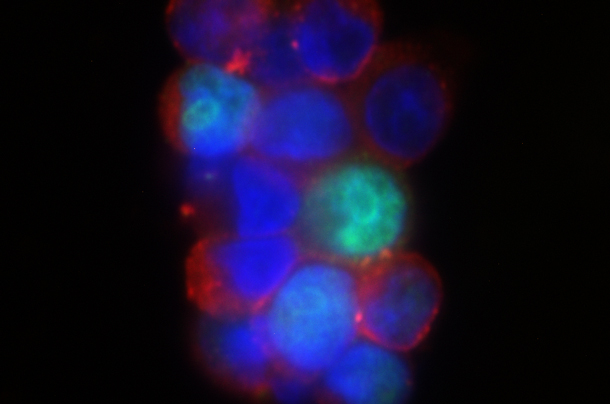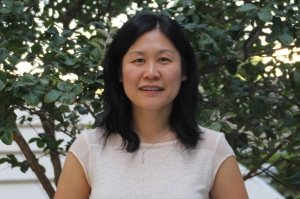As a winner of an NIH Director’s New Innovator Award, USC Stem Cell principal investigator Min Yu, MD, PhD, will strive to develop individualized medicine targeting rare and deadly breast cancer stem cells. The five-year, $2.475 million award is part of the High-Risk, High-Reward Research program supported by the NIH Common Fund.
This year’s New Innovator Awards support 41 unusually creative early-career investigators. The New Innovator Awards are unique in deemphasizing preliminary data and instead focusing on the creativity of the investigators, the innovation of the research approaches and the potential of the projects to have significant impact on important health problems.
“This program has consistently produced research that revolutionized scientific fields by giving investigators the freedom to take risks and explore potentially groundbreaking concepts,” said NIH Director Francis S. Collins, MD, PhD. “We look forward to the remarkable advances in biomedical research that the 2015 awardees will make.”
Yu’s New Innovator project tackles one of the biggest challenges for treating breast cancer: targeting rare metastatic cancer stem cells (CSCs) in a constantly evolving tumor unique to each patient.
CSCs are thought to be a highly metastatic subset of the broader population of tumor cells that enter a patient’s blood circulation. Therefore, Yu will first obtain these circulating tumor cells from patient blood samples, expand the number of these cells in the laboratory and pinpoint the most metastatic of these cells — the dangerous and deadly CSCs — by evaluating their ability to form tumors in mice.
She’ll perform studies to reveal the CSCs’ unique molecular properties and biomarkers, which are expected to vary among samples obtained from different patients. She will then test if CSCs with certain properties or biomarkers respond best to certain drugs — which could eventually inform clinicians about individualized treatment regimens for targeting CSCs in breast cancer patients.
“Breast cancer occurs in one in eight women in the United States and leads to 40,000 deaths annually,” Yu said. “I believe that we can help these patients by targeting CSCs, the most important cells for sustaining tumor growth.”
Yu has devoted herself to advancing patient care for more than 15 years. Born and raised in the city of Qingdao in northeast China, Yu earned her MD at Shandong Medical University and completed a master’s degree in neurology at Peking University Health Science Center.
After working with patients with incurable neurological diseases, Yu recognized the need to find new treatments through medical research. She joined the PhD program in genetics at SUNY Stony Brook University and Cold Spring Harbor Laboratory, where she developed her interest in breast cancer in the laboratory of Senthil Muthuswamy. She pursued postdoctoral training in the laboratory of Daniel A. Haber at Massachusetts General Hospital, Harvard Medical School, where she characterized circulating tumor cells isolated from the blood of cancer patients.
In 2014, Yu became an assistant professor in the Department of Stem Cell Biology and Regenerative Medicine and a member of the USC Norris Comprehensive Cancer Center, where her laboratory is located in close proximity to the patients and clinicians who play a key role in advancing the translational aspects of her research.
USC Norris Director Stephen B. Gruber, MD, PhD, MPH, who enabled this synergy, called Yu “a bright, innovative researcher with an exceptional track record, intriguing and clinically relevant research program, and strong drive to succeed.”
He added, “Her proposal bridges innovative basic research and translational oncology to address critical questions about cancer stem cells, and it could have a huge impact on the treatment of cancer patients worldwide.”
In addition to the NIH Director’s New Innovator Award, Yu has received the NCI Transition Career Development Award (K22), the STOP CANCER Research Career Development Award, the Pew-Stewart Scholar for Cancer Research award, and the Donald E. and Delia B. Baxter Foundation faculty fellowship.
“The New Innovator Award recognizes Min’s exceptional creativity in pursuing individualized stem cell-targeted treatments for breast cancer patients,” said Andy McMahon, PhD, FRS, chair of the Department of Stem Cell Biology and Regenerative Medicine. “Since her arrival at USC, Min has amply demonstrated this creativity — along with every other quality required to succeed in the challenging and critically important field of cancer research.”
— Cristy Lytal



